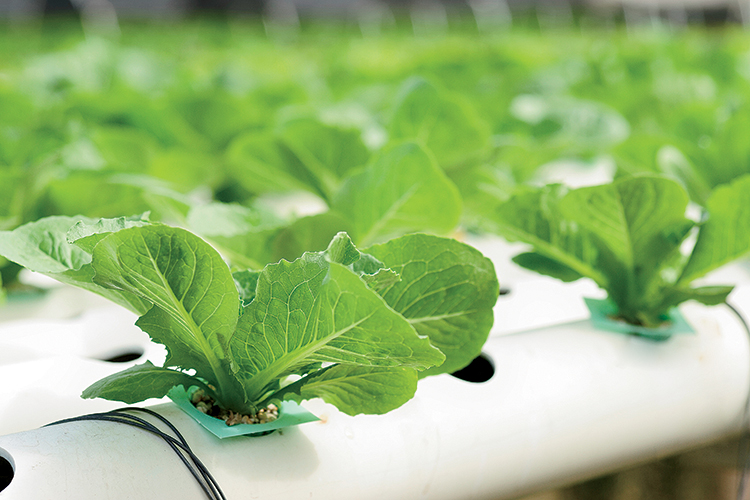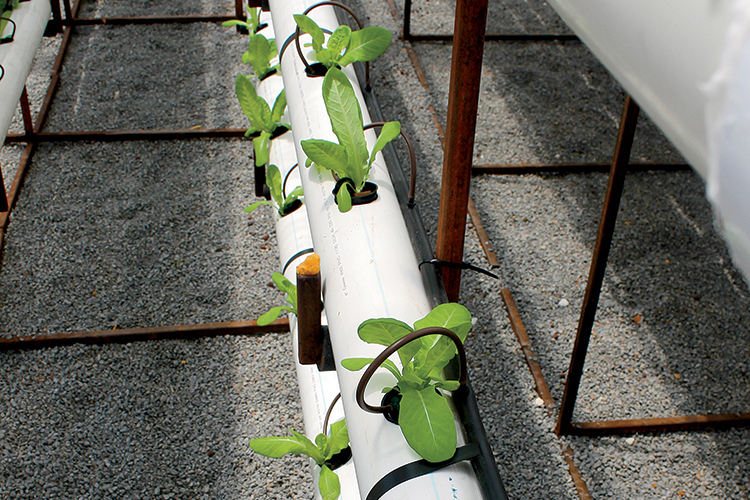Home > Arkansas > Arkansas Crops & Livestock > Southern Arkansas University Launches Hands-On Hydroponics Program
Southern Arkansas University Launches Hands-On Hydroponics Program

New research, extension, education and market opportunities are inevitable at Southern Arkansas University as part of the agriculture department’s new hydroponics program, which launched in summer 2014.
Jeff Miller, chair of the Agriculture Department, says the program will benefit students, faculty and farmers.
Research
“We built four hydroponic stations from the ground up, using materials you can buy locally,” Miller says. “We wanted to show people you don’t need to go to a specialty catalogue – everything you need can be bought at a hardware store.”
Miller uses these systems to conduct broad research about hydroponics best practices, as well as seeking answers to more specific questions that remain in the industry.
“One thing we’re trying to find out is the answer to the age-old question, ‘Can we take an abandoned warehouse and grow food?’ ” he says. “Is it practical to be able to do that, or would the energy costs be too great?”
![Arkansas Hydroponics [INFOGRAPHIC]](https://eadn-wc01-4177395.nxedge.io/wp-content/uploads/2020/05/Screen-Shot-2015-01-15-at-1.59.39-PM.png)
Extension And Education
The hydroponics project at Southern Arkansas was made possible by a Specialty Crop Block Program grant from the USDA and administered through the Arkansas Agriculture Department.
“The grant was awarded to projects that would develop a crop you could grow as a niche market crop, as well as use for educational purposes,” Miller says. “Once we get all the initial research done, we can start having field days and doing some extension work. We want to educate people on the art and science of hydroponics.”
The project will be used mostly for educational purposes on the college level — the horticulture program will use it for a teaching tool, and it will fit well with the university’s newly established plant science major.
Rachel Johnson, a senior in agriculture business, worked as an intern during the project’s first summer. She says even though she is not majoring in horticulture, she knows the experience will help her in her career as an agriculture-specific loan officer.
“I didn’t really know a whole lot about plants before doing this,” she says. “Getting hands-on experience with hydroponics has been very informative — I learned a lot about how we can implement sustainable agriculture in southern Arkansas. I think this experience will make me more compassionate in my career and help me see eye-to- eye with farmers.”
Miller says starting in the spring of 2015, Southern Arkansas University will install hydroponic stations into two seventh- and two 10th-grade classrooms to help students learn about science, agriculture and engineering in a hands-on way.
“If I had learned this in a classroom, I would not have been nearly as interested as I was getting that hands-on experience,” Johnson says. “You just can’t replace that kind of learning with knowledge from a book.”

Market Development
On the Southern Arkansas campus, there is a demand for locally grown produce raised using organic practices, and Miller says he hopes the hydroponics project can help meet that demand.
“We want to open a market on campus where people could come in and buy our lettuce on certain days,” he says. “Another outlet, if we can work out the legal hurdles, is to sell it to our institutional food provider to use for on-campus restaurants.”
Miller says the project’s multifaceted benefits will help the university attract students and enhance their education.
“I think it will attract students to SAU,” Johnson says. “I just know if future students can take as much I did out of it, they will learn a lot.”



